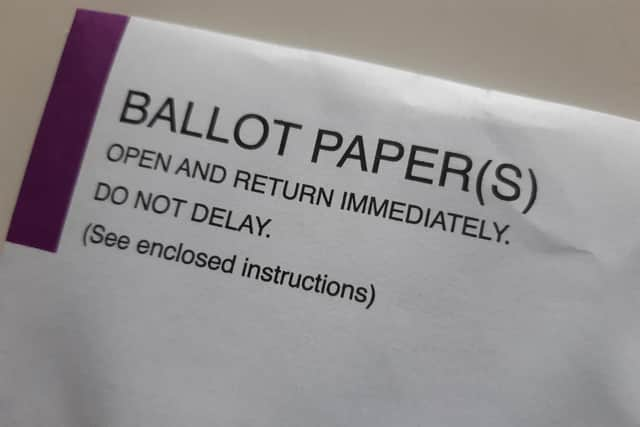Edinburgh council elections 2022: Why the Tories are unlikely to win power in the Capital – Ian Swanson
and live on Freeview channel 276
[Let us know what you think and join the conversation at the bottom of this article.]
Indeed, for many of those with a postal vote, ballot papers will have arrived and some will have filled them in and sent them back.
If opinion polls are anything to go by it looks like the SNP – which became the biggest party at Edinburgh's City Chambers for the first time at the last elections in 2017 – is set to come out on top again.


One Scottish-wide poll by Survation at the end of last month showed the party well ahead on 44 per cent with Labour in second place on 23 per cent, the Tories on 18 per cent, Lib Dems on six per cent and Greens on three per cent.
Advertisement
Hide AdAdvertisement
Hide AdIn the 2017 council elections, the SNP won 32 per cent of the vote nationwide, with the Conservatives second on 25 per cent, Labour on 20 per cent, the Lib Dems on seven and the Greens four.
Even if the poll figures are reflected in the eventual result across Scotland – and polls before the last election exaggerated the SNP lead – the picture is likely to vary from one part of the country to another.
So what is likely to happen in Edinburgh?
Last time in Edinburgh, the Conservatives were marginally ahead of the SNP in their share of the vote – the Tories winning 27.7 per cent compared to the SNP's 27.1 – but the Nationalists won 19 seats to the Tories' 18. Labour's share of the vote fell by almost 10 percentage points from the previous election to 18.4 per cent, while the Lib Dems increased their support to 13.6 and the Greens upped theirs to 12.4.
Will voters judge the SNP has done a good job over the last five years in coalition with Labour? Or will discontent over controversial issues like the Spaces for People programme or promises like the one to bring in a workplace parking levy make people to change their vote?
Advertisement
Hide AdAdvertisement
Hide AdAnd will national politics override local considerations? The SNP’s continuing popularity may trump dissatisfaction over the state of the roads or the low-emission zone.
Boris Johnson’s leadership, Partygate and the plan to send asylum seekers to Rwanda may stop people voting Conservative even if they have sympathy with the Tories’ criticism of the current administration.
Labour, for many years the ruling party in the Capital, is keen to distance itself from its coalition partners the SNP, with a promise to fight cuts in services. And it will be encouraged by polls showing the party overtaking the Tories to regain second place, raising hopes of recovery from the low point of 2017.
The Greens and Lib Dems are also optimistic about increasing their representation. And the fact that five of the six independent councillors are not seeking re-election – Ashley Graczyk in Sighthill/Gorgie being the exception – means it could be that all the parties do make gains.
Advertisement
Hide AdAdvertisement
Hide AdBut none can win an overall majority. The unwillingness of most other parties to work with the Tories makes it unlikely they could get into power. The SNP remains the party most likely to lead the administration after May 5. But official Labour policy is now against coalition, so everything else is uncertain.
Comment Guidelines
National World encourages reader discussion on our stories. User feedback, insights and back-and-forth exchanges add a rich layer of context to reporting. Please review our Community Guidelines before commenting.
